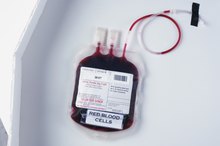What Substances Act As Natural Buffers?
The pH scale measures the acidity or alkalinity of a substance based on a scale between 0 and 14, with 0 being the most acidic, and 14 being the most alkaline (or basic) 1. Pure water falls right in the middle at 7.0 and is considered ‘neutral' on the pH scale 1. The human body maintains an internal pH balance of about 7.4. Natural buffers in the body help to balance this pH level so that it doesn't become too acidic or too alkaline.
Carbonate and Bicarbonate
Two natural buffers—carbonate and bicarbonate—play a vital role in regulating the body's blood pH levels. When the blood becomes too acidic, the body produces bicarbonate to balance out the acidity. When the blood becomes too alkaline, the kidneys introduce carbonic acid (or carbonate) into the blood to bring down the excess alkalinity.
- Two natural buffers—carbonate and bicarbonate—play a vital role in regulating the body's blood pH levels.
- When the blood becomes too alkaline, the kidneys introduce carbonic acid (or carbonate) into the blood to bring down the excess alkalinity.
Phosphate
What Is a Protein Buffer System?
Learn More
While not as widely used in the body as the carbonate-bicarbonate buffering system, the phosphate buffering system is still important and is used between cells in the urine to take acid out of the body. Phosphates literally hold onto the acidic hydrogen ions in the urine to ensure that they are eliminated and not reabsorbed back into the body.
Proteins
Although not the primary natural buffer in the body, proteins work in the cells to get rid of acids. Proteins can bind to acid as a buffering method, but if the system is too acidic, the acid can overpower the cells and saturate them. The protein buffering system works much slower than the other buffering substances, but can work with other buffers to help balance the overall pH levels in the body since cells are made up of protein and exist throughout the body.
Amino Acids
What Are the Three Buffer Systems in Body Fluid?
Learn More
Amino acids assist proteins in buffering by helping them to either release hydrogen ions when the environment is too alkaline, or bind with hydrogen when the environment becomes too acidic.
Related Articles
References
Writer Bio
Stacy Tabb began writing in 2001, specializing in business and human resources. She has written web content and other communication materials for a large Fortune 500 company. She spent two years at Northeastern University's School of Journalism before completing her bachelor's degree in psychology at Westfield State College in Massachusetts.









